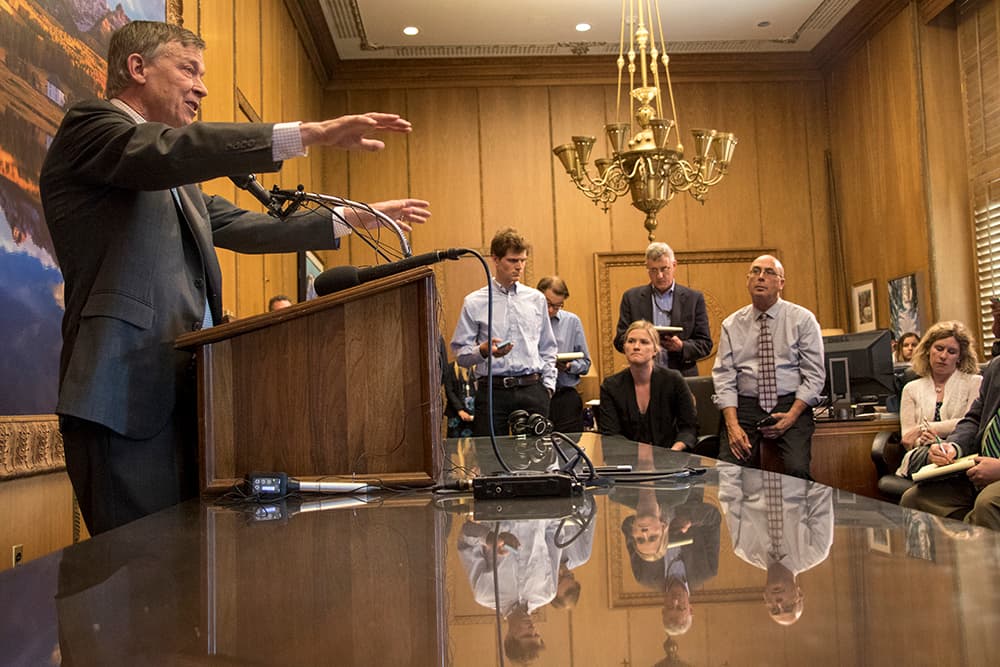
If you want to call Gov. John Hickenlooper a lame duck, go ahead. But he wants you to know this duck kept swimming through what he said was the most successful session of the General Assembly under his two terms.
Speaking to reporters on Thursday, the outgoing governor delivered remarks and answered questions over the conclusion of the legislative session, which ended Wednesday night. Hickenlooper had previously anointed last year’s session as the most successful, but said this year’s session “dwarfed” what the legislature did last year. He called the session "remarkable."
He extended the duck metaphor in describing his final term.
“I think lame duck is a common term for someone in their last year, but don’t forget that ducks aren’t always walking on the ground — some ducks have just a modest limp, rather than being lame,” Hickenlooper said. “But often, ducks are swimming. And when they’re swimming, they look, they’re placid as they float across with their little legs, their webbed feet are paddling furiously beneath the water, where you can’t see it.”
Among the highlights of the final night were last-second bills addressing the state’s pension fund and reauthorization of the Colorado Civil Rights Commission and the Civil Rights Division. Hickenlooper counted those two among his highlights for the year.
“I think a lot of people at the beginning of this session doubted how much we’d really get done in an election year,” Hickenlooper said. This session involved a lot of compromising, which Hickenlooper said, “takes a lot more out of you, takes a lot more heart, than either winning or losing.”
“It is even more exhausting, I think, to go through compromise after compromise like that legislative session did,” Hickenlooper said. “I think this is, it’s fair to say, one for the record books.”
Hickenlooper thanks leaders in both houses, House Speaker Crisanta Duran, a Democrat, and Senate President Kevin Grantham, a Republican, for, “rising to the occasion” for their leadership.
Hickenlooper lauded several bills he said seemed “improbable” at the beginning of the session.
Among the bills:
Passing of the Colorado Public Employees’ Retirement Association bill.
“The retired state workers made sacrifices. The active workers made sacrifices. The state agreed to put more money into PERA. I think when you compare it to other states have done, it will be one of the most significant balancing acts of any state pensions in the country.”
Education funding. “We made major investments in K-12 education... Also put another $30 million toward rural teachers, to make sure that we’re supporting them at a time when Gallagher (Amendment) and other constitutional forces have made it increasingly more difficult for rural school districts to successfully compete with teachers and administrators.”
Adding transportation funding. “We’re going to have $645 million just in the next two years, plus another half a billion dollars pending voter approval and bonding. This is progress but I want to make sure that we point out and reiterate, we got a $9 billion backlog. So this...is not the final solution.”
Renewing the Colorado Civil Rights Commission. “We will have again a civil rights commission, one of the state’s first lines of defense to combat discrimination and bias, to ensure workforce fairness.”
Anti-gerrymandering bill. “So, they’ll be measures on the fall ballot to allow for less partisanship in drafting voting districts for both the legislative and congressional districts.”
Increasing funding for opioid use treatment. “I think when you look at them at a whole, I think it will be among the very, most significant increases in the entire country. We took, we’ve been working on opioid for the last several years intensely, but this is where we done a bunch of programs and this is beginning to really implement. We’re not going to allow the death toll to remain at the high level that it’s been.”
It doesn’t sound like he has plans to veto any bills or have a special session.
Hickenlooper said he doesn't think he will veto any bills, though he added that he still needs to look over some bills and make sure he understands them.
There's no plans to have a special session over the failure of the so-called red flag bill, a bill Hickenlooper, in a rare move, publicly supported. The bill would have given people the ability to get a court order that would require someone considered dangerous to temporarily surrender firearms. It had support from police and prosecutors.
"It comes back down to how can you protect people's civil rights, make sure that you're absolutely protecting people's civil rights, but at the same time, let kids go to school without having to worry so much about whether someone's going to shoot up their classroom," Hickenlooper said.
A special session would cost about $100,000, Hickenlooper said, though he hasn't gotten any assurance that a special session should be an option. He said it's unlikely he would use executive action to pursue the bill.












